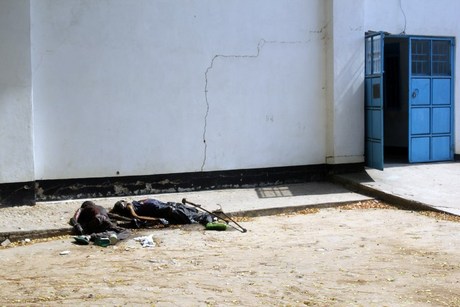Rape and Murder in South Sudan's Bor
إقرأ هذا الخبر بالعربية
Sitting in a corner under a mosquito net in Bor hospital, two women recount a horrific ordeal at the hands of South Sudanese rebels.
Achin Mapio and Mary Yar, both patients, say they were repeatedly raped, had their food stolen and watched in terror as other patients were dragged out of the wards and shot.
Situated on the banks of the White Nile river and the capital of Jonglei State, the strategic town has taken the brunt of a war that has ripped the world's youngest nation to shreds in little more than a month.
Once home to over a million people, all that remains are burnt-out buildings and the overpowering stench of death from rotting bodies.
"My leg was broken, that is why I am here," explained Mapio, a 39-year-old mother of seven children who was trapped in the town's hospital as the fighting raged outside.
"They came several times for us. We fear that these people will come again. Several of them came for us. They even bit us. They wanted to kill us," was all she would say of her ordeal, which a fellow patient revealed was several days of being repeatedly gang raped.
"We have not eaten. There is no food. They killed people. A lot of people have been killed here. They even shot some people here who were sick," Mapio said. "I saw a lot of people being killed. I was praying to God that I can live and for my family to see me again."
On Saturday, government forces loyal to President Salva Kiir backed by Ugandan troops recaptured Bor from a rebel army made up of renegade army units who support the country's former vice-president, Riek Machar, and an ethnic militia known as the White Army.
The conflict has also seen a wave of brutal ethnic violence, pitting members of President Kiir's Dinka and Machar's Nuer tribes against each other. As a Dinka trapped in rebel-held territory, Mapio said she was lucky to have lived.
Next to her, Mary Yar, a thin, shocked woman in her 40s, was in fear of the rebels coming back for more.
"We fear if those people... when they come they will rape us," she said.
Ayor Garang, aged 59, said he was also lucky to have survived and thinks the rebels took pity on him because he was blind.
"All the people that are not blind managed to take off to where they can run to -- across the Nile or to the U.N.," he said. "I am blind. They (the rebels) saw I was blind and that I can't do anything."
Garang, speaking to an Agence France Presse reporter who visited the devastated town on Sunday, recounted how the rebels stormed into the hospital to steal food from patients.
"When the rebels came they got the rest of the food and killed people. Those two people killed outside were taken from their beds... one is disabled in his leg. They were shot inside the hospital or outside there," he said.
Outside, countless dead bodies litter the roads, rotting in the intense heat and humidity.
Some of the corpses were of people killed weeks ago when government forces first recaptured the town from the rebels, although nobody has buried them.
Outside the hospital are two badly decomposed corpses. Next to one of them lies a pair of crutches -- evidence of one of countless war crimes committed by both sides during the five-week-old conflict.
Government offices, shops, the main market and abandoned vehicles have all been torched, with plumes of smoke still rising from the embers. There were visible signs of looting from shops, offices, aid agencies and the Kenyan-owned Equity bank and Kenyan Commercial Bank.
The retreating rebel army have shrugged off their loss of the town, from where they had threatened to march on the capital Juba 200 kilometers (130 miles) to the south, insisting they had made a "tactical withdrawal" in order to regroup and plan their next assault.
"It is not a big issue. Why should we waste our time on just one small county without even a population?" said rebel spokesman Lul Koang, currently part of a team of negotiators engaged in peace talks being held in a luxury hotel in neighboring Ethiopia's capital.
"There is no population in Bor," he said.



